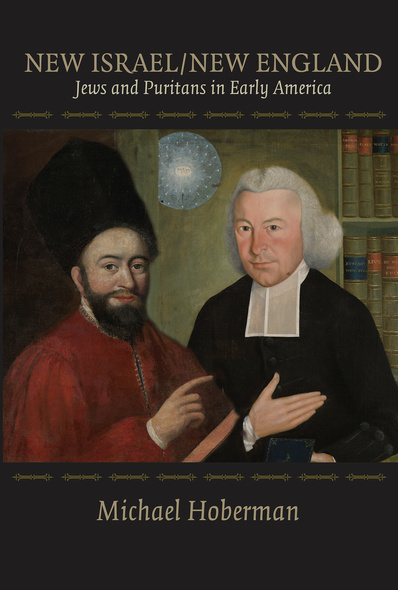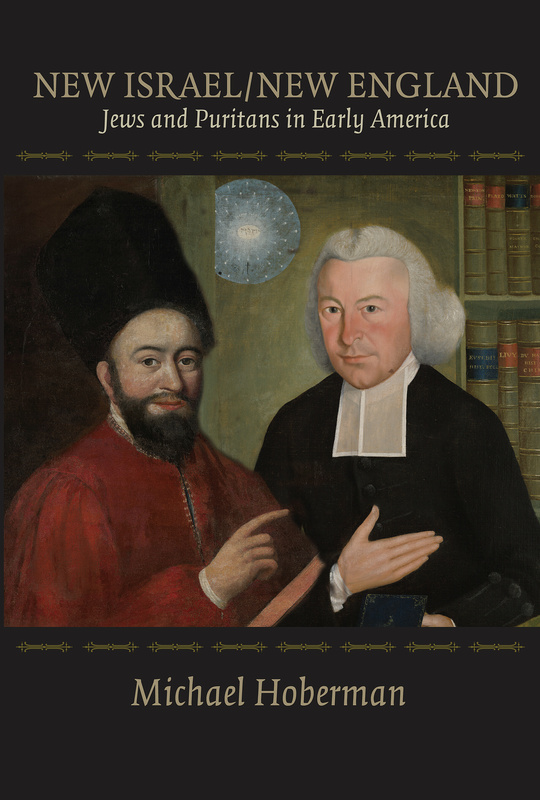New Israel / New England
Jews and Puritans in Early America
University of Massachusetts Press
The New England Puritans' fascination with the legacy of the Jewish religion has been well documented, but their interactions with actual Jews have escaped sustained historical attention. New Israel/New England tells the story of the Sephardic merchants who traded and sojourned in Boston and Newport between the mid-seventeenth century and the era of the American Revolution. It also explores the complex and often contradictory meanings that the Puritans attached to Judaism and the fraught attitudes that they bore toward the Jews as a people.
More often than not, Michael Hoberman shows, Puritans thought and wrote about Jews in order to resolve their own theological and cultural dilemmas. A number of prominent New Englanders, including Roger Williams, Increase Mather, Samuel Sewall, Benjamin Colman, Cotton Mather, Jonathan Edwards, and Ezra Stiles, wrote extensively about post-biblical Jews, in some cases drawing on their own personal acquaintance with Jewish contemporaries.
Among the intriguing episodes that Hoberman investigates is the recruitment and conversion of Harvard's first permanent instructor of Hebrew, the Jewish-born Judah Monis. Later chapters describe the ecumenical friendship between Newport minister Ezra Stiles and Haim Carigal, an itinerant rabbi from Palestine, as well as the life and career of Moses Michael Hays, the prominent freemason who was Boston's first permanently established Jewish businessman, a founder of its insurance industry, an early sponsor of the Bank of Massachusetts, and a personal friend of Paul Revere.
More often than not, Michael Hoberman shows, Puritans thought and wrote about Jews in order to resolve their own theological and cultural dilemmas. A number of prominent New Englanders, including Roger Williams, Increase Mather, Samuel Sewall, Benjamin Colman, Cotton Mather, Jonathan Edwards, and Ezra Stiles, wrote extensively about post-biblical Jews, in some cases drawing on their own personal acquaintance with Jewish contemporaries.
Among the intriguing episodes that Hoberman investigates is the recruitment and conversion of Harvard's first permanent instructor of Hebrew, the Jewish-born Judah Monis. Later chapters describe the ecumenical friendship between Newport minister Ezra Stiles and Haim Carigal, an itinerant rabbi from Palestine, as well as the life and career of Moses Michael Hays, the prominent freemason who was Boston's first permanently established Jewish businessman, a founder of its insurance industry, an early sponsor of the Bank of Massachusetts, and a personal friend of Paul Revere.
An extremely important book for early American and Jewish studies, based on extensive scholarship, clearly and interestingly written, and suitable for general readers as well as scholars interested in either of those topics.'—William Pencak, author of Jews and Gentiles in Early America, 1654-1800
'Offers a sustained analysis of how the ancient biblical Israelites and the physical presence of their latter-day descendants in colonial America figured prominently in Puritan typology, eschatology, and covenant theology. What makes this study intriguing is that Hoberman goes beyond the ideological similarities of Puritan theology and biblical Judaism by scrutinizing the personal interactions between Puritan elites and Jewish merchants, scholars, and rabbis.'—Reiner Smolinski, author of The Threefold Paradise of Cotton Mather
'New Israel / New England has performed an invaluable service by providing a clear and focused account of Puritan-Jewish interaction in early New England and the young nation.'—American Jewish History
'The merits of the book lie in its presentation of the interaction of particular Jews and particular Puritans and how that interaction was interpreted and recounted by those particular Puritans.'—American Historical Review
'[The author's] decision to analyze Jews as both subjects and objects of representation in early America makes New Israel/New England an indispensable work of scholarship that engages with and updates the classic works of scholars such as Perry Miller and Sacvan Bercovitch.'—Early American Literature
'Michael Hoberman's New Israel / New England traces some of the most important sources of Protestant America's ambivalence toward Jews. . . . Hoberman examines the interplay between abstract, imaginary, sometimes fantastical notions and face-to-face interactions between Protestant New Englanders and Jews . . . and presents a convincing, if not too surprising, argument that New England became gradually more receptive of Jews, and tolerant of a visible Jewish presence, over the course of the colonial period.'—The Historical Journal
Michael Hoberman is associate professor of English and folklore at Fitchburg State University and author of How Strange It Seems: The Cultural Life of Jews in Small-Town New England (University of Massachusetts Press, 2008).





